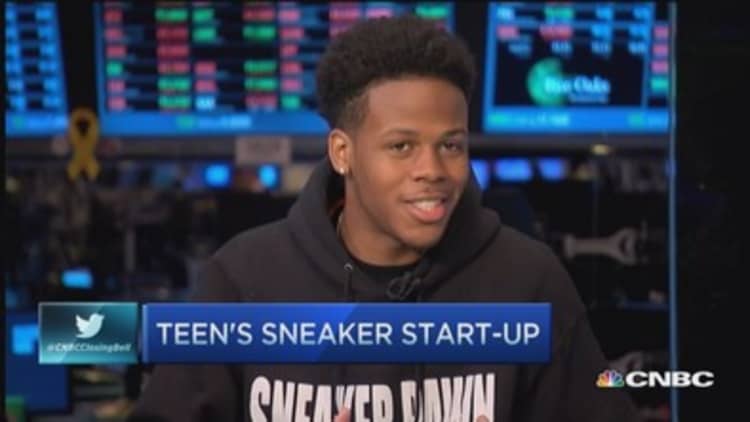In the multibillion-dollar world of sneakers that's largely populated by big shoemakers and even bigger celebrities, Vans could be considered the little brand that could.
The massive market for sports footwear—which topped $21 billion in the U.S. alone last year, according to the National Sporting Goods Association—is dominated by behemoths such as Nike, Adidas and the insurgent brand Under Armour. Yet in a sector characterized by athlete endorsements, Vans—a brand owned by VF Corp.—has quietly grown into a $2 billion imprint.
Vans, however, distinguishes itself from the competition in one particular way. In a culture driven by the outsized personalities of stars and sports figures—and some companies' reliance on those attributes to promote their brands—Vans has seen 21 consecutive quarters of double-digit growth by eschewing the imprimatur of celebrities to boost sales.
"We think about it from an authenticity standpoint," Kevin Bailey, president of VF Action Sports and Vans, told CNBC in a recent interview at the company's New York showroom. The label, which launched in 1966 and became a hit among the California skateboard and surfing set, prides itself on being a "very simple product," Bailey said.
"We've been blessed to have celebrities, musicians, artists, athletes love our brand and appreciate the fact that it wasn't [part of] an approach to them," said the New Jersey native, who at one point served as director of retail operations at Nike.
Bailey acknowledged how athletes and celebrities can sometimes "play a role" in helping a brand seem authentic to consumers. That said, linking its shoes to high-wattage names including LeBron James, Kobe Bryant or Kanye West—whose Adidas-branded boots sold out within days of their February release at $350 a pair—is an indulgence Vans doesn't see as integral to its success.
Read More Michael Jordan 'far superior' to LeBron: NBA champ
"We won't often go to you and say, 'Hey, we'd like you to be a part of our program, or design a shoe for you and you sell it,'" Bailey said. "We don't do that, and more often than not they ring our doorbell. And often we say no, because it's not right for us."
"We want them to come to us in an organic way, and tell us why Vans has meaning to them," he added.
No 'stepping stones or a payday'

For big corporate brands, celebrity endorsements may be worth their weight in gold, both for the company and the star. By itself, Nike's Michael Jordan brand grossed an estimated $2.25 billion in 2013, which helped vault the basketball icon onto Forbes' billionaires list for the first time. Separately, LeBron James' own imprint generates about $300 million a year for the company, according to the magazine.
Read MoreLeBron has new shoes, but he can't touch Jordan
Vans does have some higher-priced sneaker models above $100, and dabbles in music and the arts—primarily through sponsorship of the Warped Tour, which helped launch singers including Gwen Stefani and Katy Perry to prominence.
However, their shoes don't occupy the same strata as the bigger names in the space—something that suits the company just fine. It's an image that Bailey told CNBC is in keeping with Vans' "authentic" image.
In fact, the company's top-selling shoe is called Authentic, part of its line of classics, that has a retail price of $45, according to a spokesperson. That price is dwarfed by the three-figure sums many consumers regularly shell out for premium sneakers from Nike and Adidas, which comprise the bulk of those companies' sales.
Vans points out that while it collaborates loosely with artists and action sports athletes, there are no big endorsement deals. "We look at it as [a celebrity] wanting to come into the family, versus them wanting to use us as a stepping stone or a payday," Bailey said, pointing to a partnership the company executed with designer Marc Jacobs.
"There wasn't a payday for Marc Jacobs off of that, and we didn't sell the shoes for crazy amounts of money," he said. "We continue to believe Vans should be within reach and affordable. Where we could have probably sold those shoes for $500 or more, we didn't."
For the children
All of which means Vans can appeal to certain demographics—namely the cool and young—minus the inevitable controversies that arise when consumers stampede malls and sneaker shops for the latest pair of pricey athletic sneakers.
In a forward-looking industry, the company is fond of recalling its early years in its products. Vans tries to help generate interest in the arts—and its brand—by sponsoring a program called "Custom Culture" that invokes the days when students drew intricate designs on their clothes and books.
In its sixth year, the competition challenges high school students from more than 2,500 schools to customize four Vans sneakers around key themes. The winning school gets $50,000 to invest in their arts program. Bailey said Custom Culture is "something that's very meaningful to us because it's organic."
It also speaks to Vans' own evolution as a company, he said. "How does this little brand get to where it is without celebrity endorsements? It's been about organic growth," Bailey added. "It's a family brand and it's been about family."
Clarification: An earlier version mischaracterized Vans' "Authentic" shoe.


